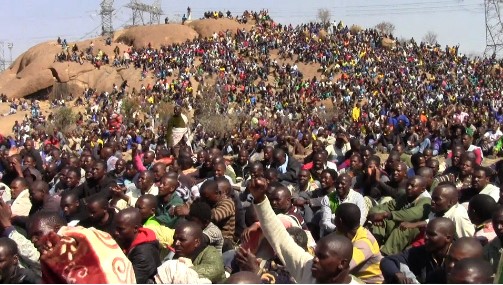On the 12th anniversary of the Marikana massacre, two organisations who represent the mineworkers’ families, say more than 100 people are yet to receive justice and reparations from the state leaving them in limbo.
On 16 August 2012, 34 striking mineworkers were shot dead by police in the worst police killing in South Africa since the end of apartheid.
In the days preceding the massacre, 10 other people were killed, including mineworkers, police officers and security guards.
In addition, at least 78 people were injured and about 250 were arrested.
The Socio-Economic Rights Institute of South Africa and Amnesty International South Africa said in a joint statement that many families have been left high and dry.
For the past two years, the Office of the Solicitor General has publicised that it has settled about R71m in loss of support to 34 of the families, comprising about 315 family members, between August 2018 and September 2019. What the office does not explain is that of these claimants, about 129 people have received nothing.
SERI Executive Director Nomzamo Zondo said:
“At the very core of the state’s position is a denial of the humanity of the men gunned down on the 13th and 16th of August 2012. If you translate the position of refusing to compensate anything more than the salaries that the miners would have supported their families with, it is that men like Stelega Gadlela and Mgcineni Noki were machines meant to generate Lonmin’s income – they were not fathers meant to raise their children, or uncles meant to look after their orphaned nieces and nephews, or husbands meant to comfort and support their wives.”
Since 2012, SERI has represented the families of 36 murdered mineworkers both in their demands for accountability for the massacre and in their civil suit against the state for compensatory damages.
The civil claim lodged on behalf of the families encompasses the following:
- An apology from the state;
- Compensation for loss of support;
- Provision for future medical expenses for treatment necessitated by the death of their loved ones;
- General damages for emotional shock and psychological damage caused by the trauma suffered in the immediate aftermath of the massacre and in the years that have followed; and
- Constitutional damages for emotional suffering and grief together with the loss of family life, which includes the loss of parental care for the children of the deceased and spousal support for the widows of the deceased.
“The state’s actions in 2012 and since then have marked the lives of these families with disruption, loss, and denial, creating a situation where each year, the families are re-traumatised while they deal with the absence of meaningful acknowledgement of the massacre by the state – let alone accountability and redress.”
The Department of Justice on Friday said that to date, approximately R352 million has been disbursed in claims related to Marikana.
The new Minister Thembi Nkadimeng said during a press briefing that he Department remains committed to finalizing this matter and ensuring that justice is served.
While some officers are facing charges for the events that took place before 16 August 2012, no police officer has been charged for the killing of 34 mine workers.
Only 9 officials have faced criminal charges, all of which have pleaded not guilty. Four officers, which included the former deputy police commissioner in the North West, were acquitted in 2021.
Amnesty International South Africa Executive Director Shenilla Mohamed said:
“The lack of accountability for victims and their families is a recurring theme in South Africa, but we need to continue demanding answers as to why it is taking more than a decade in the case of the Marikana massacre for there to be any prosecutions, and ultimately accountability for the brutal loss of life.”
“The victims and their families cannot be made to wait another year, never mind another 12 years for justice. This will just result in the continued lack of accountability for the unlawful killings by police.”
READ: Marikana massacre: South Africa needs to build a society that’s decent and doesn’t humiliate people


